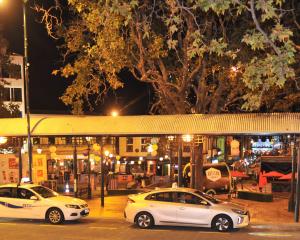Dunedin's biggest taxi operator says its decision not to hike fares could stabilise city prices even as rival companies get ready to review their rates.
Dunedin Taxis has confirmed it will not try to recoup the forthcoming GST increase and the lingering impact of the emissions trading scheme this year.
It will instead review its fares in February, about the same time taxi companies will start mulling the cost of installing compulsory in-taxi video cameras.
The surprise move came from shareholder drivers at the company's annual meeting last month, company chairman Tony Ross said.
The fares, last increased in 2008, would stay as they were, unless exceptional new costs, such as sustained, high petrol prices, intervened between now and the end of the new year.
It was a gesture of good faith to clients but it also recognised the potential for other cost pressures to rear their heads over the next six months, he said.
The emissions trading scheme might have a "small" effect on operating costs, and the in-cab cameras, which some tipped could cost $2500, would have to be considered.
It made sense to review fares when the industry had a better idea of how these costs would affect the cost of business, Mr Ross said.
The move would be watched closely by operators wary of a consumer backlash if they increased their prices before next year.
"It's kind of like when one petrol company increases its prices, all the others do," Mr Ross said.
"But if one decides to hold out, then the rest of the market could stay where it is."
United Taxis manager Ross Overton said his company was keeping a close eye on fuel and maintenance costs, but had no immediate plans to increase fares to offset the new GST.
It would be silly to add another 2.5% to fares when additional costs, such as the impact of the emissions trading scheme, were still unclear, he said.
Southern Taxis co-owner Maureen Grant expected this year to review prices that had remained unchanged since July 2008.
GST, maintenance, and fuel costs had all gone up and the company "had to pay for them somehow".
The Dunedin market was very competitive, and price increases were not made lightly.
It could cost about $100 a car to change fare meters and signage, so fares were only increased when companies "absolutely have to", she said.
Otago Taxis manager Katherine Ritchie said her company would also review fares, which she said remained the lowest in the city.
The review would consider the impact of rising costs on margins before a decision was made.
"But I would say that the introduction of the new GST comes at an unfortunate time for the economy and for businesses everywhere, not just for taxis. There will be plenty of companies considering their next move."
Mosgiel Taxis co-owner Dinah Harrington said she had yet to consider a review.
City Taxis manager Frank Wilks and Corporate Cabs South Island operations manager Gerard Gibb did not return calls.
Dunedin taxi fares:
Dunedin Taxis: $2.50 flag fall, $2.60 per km
Otago Taxis: $1.90 flag full, $2 per km
City Taxis: $2.90 flag fall, $2.60 per km
Southern Taxis: $2.50 flag fall, $2.70 per km
Corporate Cabs: $4 flag fall, $2.60 per km
Mosgiel Taxis: $2 flag fall, $2.60 per km
United Taxis: $2.50 flag fall, $2.40 per km
Fares are cheapest telephone quotes for non-discounted daytime prices for casual clients.




